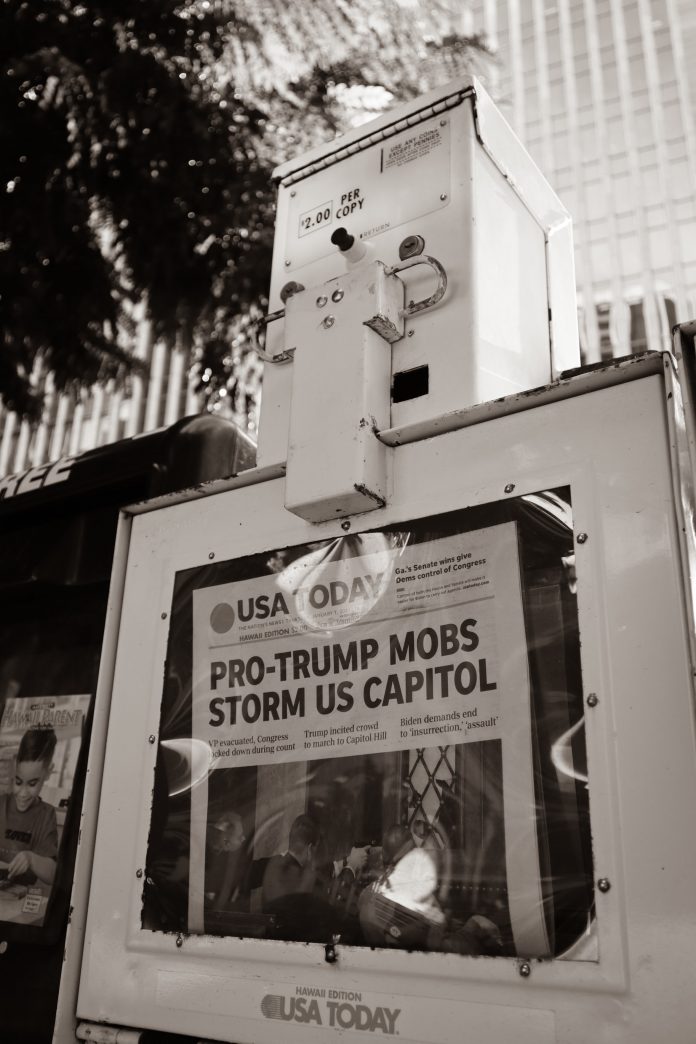Natalia Hernandez
Copy Editor
As the historic second impeachment trial of Donald Trump ends in a predictable acquittal, the most notable line from Amanda Gorman’s beautiful poem, “The Hill We Climb” ended up being short-lived: “When day comes, we step out of the shade, aflame and unafraid. / The new dawn blooms as we free it. / For there is always light, / if only we’re brave enough to see it. / If only we’re brave enough to be it.”
Of course, Gorman was referring to the violence in 2021’s foreseeable future after Joe Biden’s victory over the incumbent president. Jan. 6 was the climax to the angry right-wing’s refusal to accept the election results, and with a Democratic majority in all branches of government, impeachment should have been the last nail in the coffin of the Trump presidency.
The outcome of the impeachment trial leaves the country with an unsettling feeling, since it opens the door for what’s left of the Trump team and the GOP to reorganize for a possible 2024 strategy.
Approximately one year ago, the first impeachment trial went underway. The Democratic House impeachment managers submitted two articles of impeachment: abuse of power and obstruction of Congress. These two articles of impeachment were abstract to most Americans at the time. We didn’t see exactly what the president did, we were just shown evidence of election interference from a long whistleblower investigation that the public could care less about.
“Lead House manager Jeremy Raskin made a point that this wasn’t about party politics. A decision to convict would have said something about who we are as a country and where we are going.”
It was easy for right-wing extremists to feed into Trump’s claim that his impeachment was a “witch hunt” — a phrase that fueled one of many strongly held beliefs behind the nationalist violence across the country. The second impeachment however, was based on a seditious mob that broke into the Capitol to stop the peaceful transition of power that is essential to our democratic process. This event was undoubtedly televised in front of the eyes of not just the American people, but unfortunately, for a global audience.
Democratic House managers presented evidence in hopes of preventing Trump from creating a “January exemption” of impeachment. This would mean any outgoing president could act lawlessly in their last month in office without facing any repercussions because an impeachment trial would take place after their term expired.
The Democratic House impeachment managers used emotionally driven arguments that forced everyone to relive the trauma that was Jan. 6 at the Capitol. Representative of California Ted Lieu explained, “‘President Trump’s lack of remorse shows that he will undoubtedly cause future harm if allowed. I’m not afraid of Donald Trump running again in four years. I’m afraid he’s going to run again and lose, because he can do this again.’”
Trump’s destructive tendencies have always had dire consequences, and the second impeachment was supposed to prevent him from holding any future position in the federal government. Lead House manager Jeremy Raskin made a point that this wasn’t about party politics. A decision to convict would have said something about who we are as a country and where we are going. “Senators, this trial, in the final analysis, is not about Donald Trump. The country and the world know who Donald Trump is. This trial is about who we are, who we are,” Raskin said.
“Compared to the first impeachment with Mitt Romney’s lonely vote to convict, the second impeachment had a bipartisan vote but, unfortunately, not enough during the time that mattered the most.”
From the moment the former president walked down the escalator as a prospective presidential candidate in the summer of 2015 at Trump Tower in New York, America was headed toward a period of modern civil war. Taking away his ability to run from public office wouldn’t immediately delete his ability to dominate the public’s attention, but it would have been in perfect harmony with what Amanda Gorman referred to as “a country that isn’t broken but simply unfinished.”
How can we rewrite the future of a country whose very institutions continually undermine our sacred democratic processes? Compared to the first impeachment with Mitt Romney’s lonely vote to convict, the second impeachment had a bipartisan vote but, unfortunately, not enough during the time that mattered the most.
Trump is already talking about forming his own political party: the Patriot Party. The GOP is at a crossroads right now: either stick with the Trump loyalists like Majorie Taylor Greene, or restructure the platform back to the respectable conservative values embodied by Republicans like the late John McCain.
Senate Minority Leader Mitch McConnell showed contempt for Trump by calling his incendiary language “a disgraceful, disgraceful dereliction of duty” — a claim that did not reflect a vote for conviction.
Impeachment was starting to allude to President Joe Biden’s calls for bipartisanship, but nonetheless, the 43 members who declined to convict the insurrectionist president proved the spineless leadership of the GOP won’t just disappear “like a miracle,” to quote the former president.
If the insurrectionist mob and the violence they produced weren’t enough, what will be? When do we reach a point as a country where we can finally move away from the damage Trump has done? The calls for unity at this point are quite naive to propose as a solution to the trauma the past five years have brought the American people. It feels like we’ve been waiting for the ending of the American story that never seems to be finished, and the worst may be yet to come.











